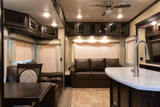What Does The Future Look Like for RVs?
RVing and driving your rig across the nation is associated with freedom, but do you know what would be even more free? Not having to stop for gas or even drive the rig in the first place. Is this the future of RVs? It’s certainly looking that way. From electronic systems to self-driving capabilities to the luxury life that some companies are starting to dream of, who knows where the future of RVing will take us.
With the rise of RV culture following the 2008 recession, we have seen advancements come about that have enhanced the RV life. But RV companies aren’t going to stop there. Most RVs are gas guzzlers, creating pollution and leaving you with a big gap in your wallet from all of those gas station stops. With the integration of electric capacities in RV living, you could be able to skip those gas stations altogether and run on clean, silent energy. Depending on the battery pack that comes with your RV, you could even be able to travel miles upon miles over what you would have been able to with the gas-powered version of the same RV. And when you get to the campground, you can just fill up your rig overnight and leave with a full battery in the morning. The integration of self-driving technology could elevate this freedom even further, allowing the driver to sightsee and maybe even eliminating the need to have a driver at all.
With all of the new technology coming out in the vehicle industry, it’s only a matter of time for the RVs to catch up. Electric self-driving cars are already here, after all.
What’s Happening at Lordstown?
Lordstown Motors is first on our list of companies that are working towards the future of RVs. Lordstown Motors is an Ohio-based electric vehicle startup that has plans to create the Endurance, an electric pickup truck. In addition, they plan on partnering with Camping World and using the tech from Endurance to manufacture an electric travel trailer, calling it a Class E RV. The Endurance itself is scheduled to enter production in 2022 with 600 horsepower, a range of 250 miles per charge, and with a starting price of $52,500. The “skateboard” style chassis and battery pack are what their new line of RVs will be based off of, as the chassis is able to accommodate many different body types. Their first RVs will likely be van-style travel trailers with a simple body and design on it. Unlike the others on this list, this model will not be some space-style futuristic adventure, but rather an upgrade on the power system. The battery pack system will replace the gas engines and generators, providing quiet, emission-free power. This project differs from other futuristic, electric vehicle ambitions mainly in the price. They don’t want electric vehicles to be limited to the wealthy, but rather be accessible to people who just want to travel or people who are looking for a retirement plan to live comfortably on the road. Included with these RV plans, they are working on batteries for travel trailers that can be integrated into the bodies of other RVs, such as those from Thor, as well as adding charging stations into the various Camping World locations to provide a greater level of accessibility for campers.
They plan to have a mock environment ready for testing by June of this year and to test their electric trailers as soon as possible. They project to have these trailers ready for sale in 2022.
Is Tesla Working on Electric RVs?
By now, we’ve all heard of Tesla. The high-tech vehicle manufacturer has made a name for themselves with their futuristic visions. While they have electric cars already available on the market, they don’t plan to stop there. While they are not ready to manufacture or test it, they are working on a concept for an electric, self-driving motorhome. As of now, they are preparing to launch their ‘Tesla Semi’, which works on an electric system. And while this vehicle is obviously not an RV, they are showing that they have the technology to design and manufacture a large electrical vehicle meant to travel miles upon miles at a time. That sounds an awful lot like an RV. And many people agree. With this design, the possibilities for an electric self-driving RV are endless. Currently, their concept would include 6 beds, a full kitchen, a living space, toilet, and other luxury RV accessories in the motorhome. Adding in the autopilot, self-driving function adds an incredible advantage for the driver, both in the ability to enjoy the scenery and in the added safety of not needing to drive for hours at a time and becoming tired or sore. The downside of this? The price is estimated to start at $180,000 for just the body, not including the various additional features for the motorhome.
What is the Hymer Galileo?
If you thought the Tesla model concept was mind blowing, you better hang on. The Hymer Galileo is so ambitious and future-focused that they are looking to release it around 2030. There are no physical concept vehicles or spec sheets available as of yet, but the vision and rendered graphics are enough to wow you. With this concept, they are taking travel and leisure to some serious new ground. In essence, their concept is to create electric, self-driving, tour-guided camper pods that are customized to the traveler’s every whim. That’s right. The future that we dream about in science fiction might be becoming a reality. The company even thinks that these luxury living pods could replace the average motorhomes and trailers and even some hotels and permanent residences. With all the amenities they are predicting to be adding, the Galileo pods are more like a moving luxury suite rather than a simple camper. To order one, each customer would personalize the floor plan and amenities package. Then, the team of human and robot workers would create the pods and drop them onto an electric skateboard chassis. From here, they would release it onto the road where it would drive itself to the customer’s house. I don’t know whether that’s amazing or scary, but it’s certainly futuristic. Not sure whether you would want to fully buy one? Don’t worry; you can just rent or lease one. If you rent one, it would come with a battery pack sized appropriately for the intended mileage. If you’re looking to have a more free-form trip and don’t have an actual path set up yet, the pod would locate and reroute your trips to charging stations when the need arises. Because it uses electricity, it would have no need for the extra bulk of a combustion engine bay and with the self-driving capability, there would be no need for a cockpit. With both of these areas gone, there is more room for a large, open space inside, stretching from the front windshield to the back windshield. Included in the amenities package would be a kitchen block, bunk beds, a bathroom compartment, a convertible dinette, and smart technologies such as transparent information displays on the windows and a health-monitoring station. Wow, right?
While the Galileo is not even close to its physical creation, the idea of such technology tells us that the future isn’t too far away.
With the various advancements in technology, from electric motors to self-driving systems to even more amazing features that are coming out and being designed, it won’t be long until the future hits the RV industry.
Recent Posts
-
How to Keep Your Pets Safe While Camping
RVing and camping are a great getaway from the hustle and bustle of work and the city and the day-to …Jul 2nd 2024 -
Why Replace Your RV Furniture?
You may wonder when is the best time to replace your RV furniture. There is no one right answer to t …May 20th 2024 -
Can You Put Regular Furniture in an RV?
Many new and old RV owners ask themselves this question when they feel the need to update th …Apr 25th 2024 -
4 Tips for Securing RV Furniture While Traveling | RecPro
How To Secure RV Furniture There are few things that beat going out on an adventure with an RV …Apr 25th 2024 -
How To Keep RV Furniture From Peeling
Peeling RV Furniture | Why it Peels and How to Stop it Your RV furniture is a point of pride on yo …Apr 25th 2024 -
Turning up the Heat With an RV Fireplace
There’s an unlimited number of cool and exciting features you could add to your recreational vehicle …Apr 25th 2024







